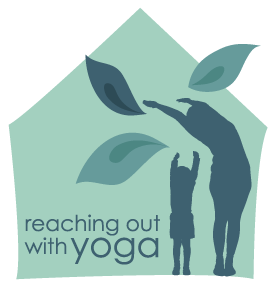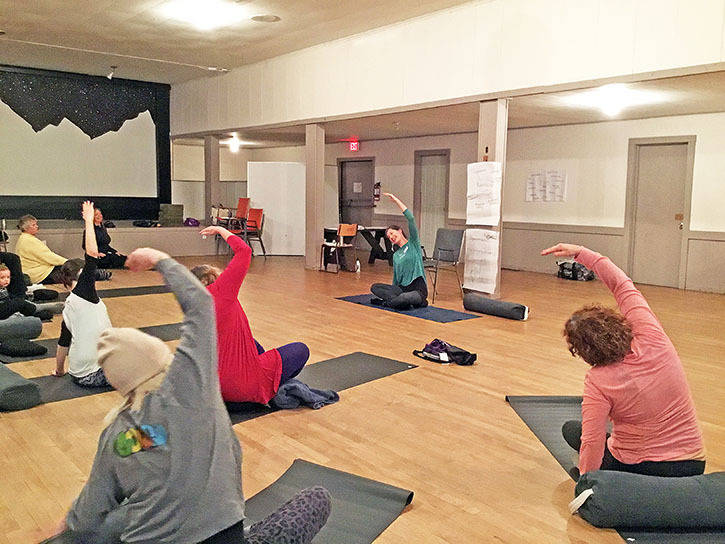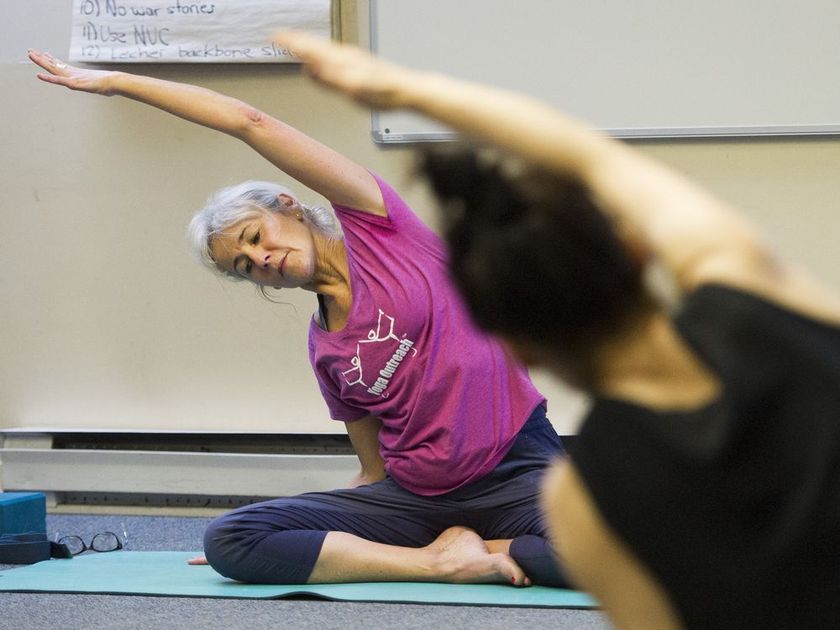Healing the Wounds from Violence with Yoga

The BC Society of Transition Houses is a member-based, provincial umbrella organization that, through leadership, support and collaboration, enhances the continuum of services and strategies to respond to, prevent and end violence against women, children and youth.
Reaching out with Yoga is a research project bringing trauma-informed yoga to women, children and youth who have experienced violence and are using transition or second stage housing services in BC, as well as to those who support them. Yoga teachers from the community will be trained in trauma-informed yoga in order to teach these classes. The project will explore how this style of yoga impacts the health and wellbeing of women and children who have experienced violence, as well as anti-violence workers.

This is a collaborative project between the BC Society of Transition Houses and Yoga Outreach, a non-profit organization bringing together volunteer yoga teachers with community and social service organizations, to provide mindfulness-based, trauma-informed yoga programming to adults and youth in these facilities.
https://bcsth.ca/projects/reaching-out-with-yoga/
facebook.com/bcsth | twitter.com/bcsth
You don’t have to go far to read about the potential health benefits of yoga – both for the body and the mind. However, for women and children who have experienced violence, being present in the body that has been the site of physical or sexual abuse, or receiving hands on adjustments, has the potential to trigger memories of past traumatic experiences. Trauma-Informed Yoga[i] adapts traditional yoga techniques such as grounding exercises; simple yoga postures (asana); meditation; and therapeutic breath-work (pranayama) to make it more accessible and safe for individuals with experiences of violence. It focuses on safety, choice, and empowerment: invitational language and a no-touch, no-assist approach are used. Classes are offered in an environment that promotes safety and provides privacy. Trauma-Informed yoga practitioners are invited to do only what feels good for them and their body, and to notice their internal experiences throughout the practice, supporting them to reconnect with their body and breath on their own terms and in an empowered way.
‘Reaching Out with Yoga’ (ROWY) is a research project funded by the Public Health Agency of Canada to test the potential healing benefits of trauma-informed yoga for women and their children who have experienced violence. Trauma-informed yoga is being offered in 24 transition houses (shelters for women and children fleeing violence) or PEACE programs for children (Prevention Education Advocacy Counselling Empowerment) across British Columbia and is being carried out by the BC Society of Transition Houses and Yoga Outreach.
Image credit: Yoga Outreach
Why we are doing this work
There is growing evidence supporting the use of yoga as a complementary therapy for individuals who have experienced trauma and/or violence. Yoga - a practice that helps to calm the mind and body - can help to alleviate trauma symptoms such as anxiety, poor sleep and hyperarousal by supporting practitioners to learn self-regulation techniques, and helping them to feel safe in their bodies[1] [2]. Yoga may help individuals who have experienced trauma to function better in daily life by enabling them to transfer these techniques off the mat and utilize them to stay present and tolerate intense emotions associated with past traumatic experiences as they arise [3]. The mindfulness meditation component of yoga has additional proven healing benefits including decreasing anxiety and depression, and improving blood pressure and stress-levels [3].
Currently there is little research on the potential healing benefits of trauma-informed yoga for women, children and youth who have experienced violence. The Reaching Out with Yoga project is the first study to test this in a large Canadian sample.
What have we found so far?
The initial findings are highly encouraging. After completing four or more yoga classes, women participants[ii] have reported noticing a variety of positive changes including increased interest in doing physical activity, increased energy levels, and a decrease in post-traumatic stress disorder (PTSD) symptoms such as pain and discomfort in the body; negative memories, intrusive thoughts and bad dreams; and feelings of fear and worry:
“When I get stressed or frustrated, I breathe. Just big breaths, to calm me down”.
Some women have reported that they are more easily able to calm themselves since having done some yoga classes and that their sleep is improving:
“If I’m having trouble sleeping I’m learning to relax and shut things down one at a time”.
Some have reported feeling strength and power in their bodies:
“I got happiness in becoming aware of how agile and strong my body still is.”
And some have commented that they like the yoga so they want to continue it beyond the ROWY program:
“I am going to keep trying to do it on my own at home. I want to keep working on my flexibility”
“I will continue. I enjoy it and it helps with my depression”

Image credit: Yoga Outreach & Gerry Kahrmann
Transition houses can provide a suitable setting for trauma-informed yoga classes
Transition houses provide an opportunity for healing in a safe setting that participants are already familiar with, among other women with shared experiences of violence and with access to support staff if difficulties arise. Holding the yoga classes in the transition house removes key barriers faced by many women with experiences of violence. For example, classes are provided free of charge, transportation is not required, and childcare can be provided on site. Furthermore, the stress women can experience in mainstream yoga classes in relation to body image, having appropriate or trendy attire, and feeling pushed to do advanced postures, can be mitigated by offering trauma-informed yoga in this no pressure and welcoming environment.
Please share with anyone you know who might be interested, or get in to touch for more information about Trauma-Informed Yoga.
1. Emerson, D. et al. (2009). Trauma-sensitive yoga: Principles, practice, and research. International Journal of Yoga Therapy. 19(1): p. 123-128.
2. Rhodes, A.M. (2015). Claiming peaceful embodiment through yoga in the aftermath of trauma. Complementary therapies in clinical practice. 21(4): p. 247-256.
3. van der Kolk, B.A., et al. (2014). Yoga as an adjunctive treatment for posttraumatic stress disorder: A randomized controlled trial. J Clin Psychiatry. 75(6): p. e559-e565.
